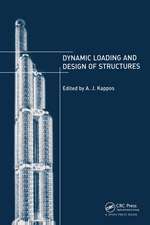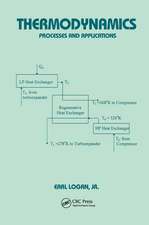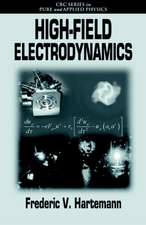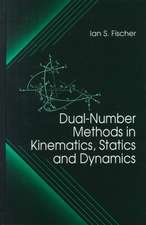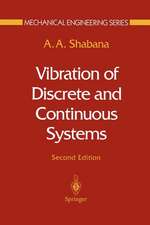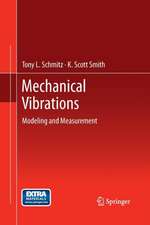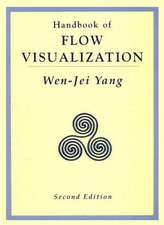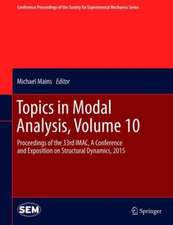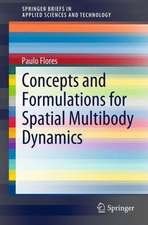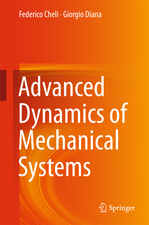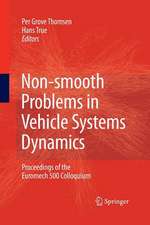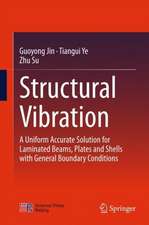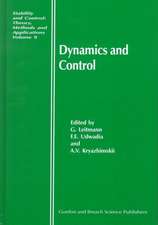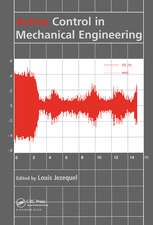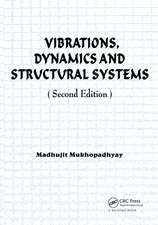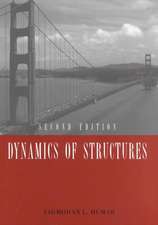Theory of Vibration: An Introduction: Mechanical Engineering Series
Autor Ahmed A. Shabanaen Limba Engleză Paperback – 14 feb 2019
| Toate formatele și edițiile | Preț | Express |
|---|---|---|
| Paperback (1) | 509.25 lei 38-44 zile | |
| Springer International Publishing – 14 feb 2019 | 509.25 lei 38-44 zile | |
| Hardback (1) | 631.70 lei 3-5 săpt. | +31.29 lei 7-13 zile |
| Springer International Publishing – 23 oct 2018 | 631.70 lei 3-5 săpt. | +31.29 lei 7-13 zile |
Din seria Mechanical Engineering Series
-
 Preț: 391.84 lei
Preț: 391.84 lei - 18%
 Preț: 1110.72 lei
Preț: 1110.72 lei - 15%
 Preț: 593.73 lei
Preț: 593.73 lei - 18%
 Preț: 944.99 lei
Preț: 944.99 lei - 15%
 Preț: 653.14 lei
Preț: 653.14 lei - 17%
 Preț: 363.12 lei
Preț: 363.12 lei - 18%
 Preț: 1239.05 lei
Preț: 1239.05 lei - 15%
 Preț: 640.06 lei
Preț: 640.06 lei - 18%
 Preț: 1129.65 lei
Preț: 1129.65 lei - 15%
 Preț: 522.24 lei
Preț: 522.24 lei - 15%
 Preț: 654.77 lei
Preț: 654.77 lei - 15%
 Preț: 643.34 lei
Preț: 643.34 lei - 15%
 Preț: 611.40 lei
Preț: 611.40 lei - 18%
 Preț: 765.96 lei
Preț: 765.96 lei - 20%
 Preț: 631.70 lei
Preț: 631.70 lei - 18%
 Preț: 1009.22 lei
Preț: 1009.22 lei -
 Preț: 418.34 lei
Preț: 418.34 lei - 15%
 Preț: 640.71 lei
Preț: 640.71 lei -
 Preț: 403.53 lei
Preț: 403.53 lei - 18%
 Preț: 813.97 lei
Preț: 813.97 lei - 18%
 Preț: 1386.48 lei
Preț: 1386.48 lei - 18%
 Preț: 951.47 lei
Preț: 951.47 lei - 18%
 Preț: 833.09 lei
Preț: 833.09 lei - 18%
 Preț: 942.01 lei
Preț: 942.01 lei - 15%
 Preț: 644.49 lei
Preț: 644.49 lei - 18%
 Preț: 941.05 lei
Preț: 941.05 lei - 18%
 Preț: 1386.17 lei
Preț: 1386.17 lei -
 Preț: 399.67 lei
Preț: 399.67 lei - 18%
 Preț: 1394.84 lei
Preț: 1394.84 lei - 18%
 Preț: 790.46 lei
Preț: 790.46 lei - 18%
 Preț: 1388.22 lei
Preț: 1388.22 lei - 18%
 Preț: 1024.53 lei
Preț: 1024.53 lei - 15%
 Preț: 590.16 lei
Preț: 590.16 lei - 18%
 Preț: 1234.00 lei
Preț: 1234.00 lei - 18%
 Preț: 1386.62 lei
Preț: 1386.62 lei - 15%
 Preț: 543.85 lei
Preț: 543.85 lei -
 Preț: 391.61 lei
Preț: 391.61 lei - 18%
 Preț: 944.19 lei
Preț: 944.19 lei - 18%
 Preț: 736.16 lei
Preț: 736.16 lei - 18%
 Preț: 943.88 lei
Preț: 943.88 lei - 15%
 Preț: 693.21 lei
Preț: 693.21 lei - 18%
 Preț: 781.77 lei
Preț: 781.77 lei - 15%
 Preț: 639.08 lei
Preț: 639.08 lei - 23%
 Preț: 737.28 lei
Preț: 737.28 lei - 15%
 Preț: 641.53 lei
Preț: 641.53 lei -
 Preț: 401.42 lei
Preț: 401.42 lei
Preț: 509.25 lei
Preț vechi: 628.71 lei
-19% Nou
Puncte Express: 764
Preț estimativ în valută:
97.49€ • 100.32$ • 82.18£
97.49€ • 100.32$ • 82.18£
Carte tipărită la comandă
Livrare economică 25 februarie-03 martie
Preluare comenzi: 021 569.72.76
Specificații
ISBN-13: 9783030068240
ISBN-10: 3030068242
Pagini: 375
Ilustrații: XIII, 375 p. 184 illus., 125 illus. in color.
Dimensiuni: 155 x 235 x 24 mm
Greutate: 0.54 kg
Ediția:Softcover reprint of the original 3rd ed. 2019
Editura: Springer International Publishing
Colecția Springer
Seria Mechanical Engineering Series
Locul publicării:Cham, Switzerland
ISBN-10: 3030068242
Pagini: 375
Ilustrații: XIII, 375 p. 184 illus., 125 illus. in color.
Dimensiuni: 155 x 235 x 24 mm
Greutate: 0.54 kg
Ediția:Softcover reprint of the original 3rd ed. 2019
Editura: Springer International Publishing
Colecția Springer
Seria Mechanical Engineering Series
Locul publicării:Cham, Switzerland
Cuprins
1 Introduction.- 1.1 Basic Definitions.- 1.2 Elements of the Vibration Models.- 1.3 Particle Dynamics.- 1.4 Systems of Particles.- 1.5 Dynamics of Rigid Bodies.- 1.6 Linearization of the Differential Equations.- 1.7 Idealization of Mechanical and Structural Systems.- Problems.- 2 Solution of the Vibration Equations.- 2.1 Homogeneous Differential Equations.- 2.2 Initial Conditions.- 2.3 Solution of Nonhomogeneous Equations with Constant Coefficients.- 2.4 Stability of Motion.- Problems.- 3 Free Vibration of Single Degree of Freedom Systems.- 3.1 Free Undamped Vibration.- 3.2 Analysis of the Oscillatory Motion.- 3.3 Stability of Undamped Linear Systems.- 3.4 Continuous Systems.- 3.5 Equivalent Systems.- 3.6 Free Damped Vibration.- 3.7 Logarithmic Decrement.- 3.8 Structural Damping.- 3.9 Coulomb Damping.- 3.10 Self-Excited Vibration.- 3.11 Motion Control.- 3.12 Impact Dynamics.- Problems.- 4 Forced Vibration.- 4.1 Differential Equation of Motion.- 4.2 Forced Undamped Vibration.- 4.3 Resonance and Beating.- 4.4 Forced Vibration of Damped Systems.- 4.5 Rotating Unbalance.- 4.6 Base Motion.- 4.7 Measuring Instruments.- 4.8 Experimental Methods for Damping Evaluation.- Problems.- 5 Response to Nonharmonic Forces.- 5.1 Periodic Forcing Functions.- 5.2 Determination of the Fourier Coefficients.- 5.3 Special Cases.- 5.4 Vibration Under Periodic Forcing Functions.- 5.5 Impulsive Motion.- 5.6 Response to an Arbitrary Forcing Function.- 5.7 Frequency Contents in Arbitrary Forcing Functions.- 5.8 Computer Methods in Nonlinear Vibration.- Problems.- 6 Systems with More Than One Degree of Freedom.- 6.1 Free Undamped Vibration.- 6.2 Matrix Equations.- 6.3 Damped Free Vibration.- 6.4 Undamped Forced Vibration.- 6.5 Vibration Absorber of the Undamped System.- 6.6 Forced Vibration of Damped Systems.- 6.7 The Untuned Viscous Vibration Absorber.- 6.8 Multi-Degree of Freedom Systems.- Problems.- 7 Continuous Systems.- 7.1 Free Longitudinal Vibrations.- 7.2 Free Torsional Vibrations.- 7.3Free Transverse Vibrations.- 7.4 Orthogonality of the Eigenfunctions.- 7.5 Forced Longitudinal and Torsional Vibrations.- 7.6 Forced Transverse Vibrations.- Problems.- References.- Answers to Selected Problems.
Notă biografică
Dr. Ahmed A. Shaban is Richard and Loan Hill Professor of Engineering, Department of Mechanical Engineering, University of Illinois at Chicago.
Textul de pe ultima copertă
This fully revised and updated third edition covers the physical and mathematical fundamentals of vibration analysis, including single degree of freedom, multi-degree of freedom, and continuous systems. Adding a new chapter on special topics such as motion control, impact dynamics, and nonlinear dynamics, this textbook imparts a sound understanding of the fundamental theory of vibration and its applications. In a simple and systematic manner, it presents techniques that can easily be applied to the analysis of vibration of mechanical and structural systems. Unlike other texts on vibrations, the approach is general, based on the conservation of energy and Lagrangian dynamics, and develops specific techniques from these foundations in clearly understandable stages. Suitable for a one-semester course on vibrations, the book presents new concepts in simple terms and explains procedures for solving problems in considerable detail. It contains numerous exercises, examples and end-of-chapterproblems.
- Features updates and revisions to all chapters as well as new sections on motion control, impact dynamics, and nonlinear dynamics;
- Provides lucid yet rigorous review of the mathematics needed for the solution of the vibration equations;
- Presents complete coverage of the theory of vibration with focus of the fundamentals, numerical and computer methods;;
- Reinforces concepts with numerous exercises and examples and end-of-chapter problems;
- Includes a Fortran code for solving ODEs of nonlinear vibration systems.
Caracteristici
Features updates and revisions to all chapters including coverage of important nonlinear dynamics topics Provides lucid yet rigorous review of the mathematics needed for the solution of the vibration equations Presents complete coverage of the theory of vibration with focus on the fundamentals, numerical and computer methods Reinforces concepts with numerous exercises and examples and end-of-chapter problems Includes a Fortran code for solving ODEs of nonlinear systems

